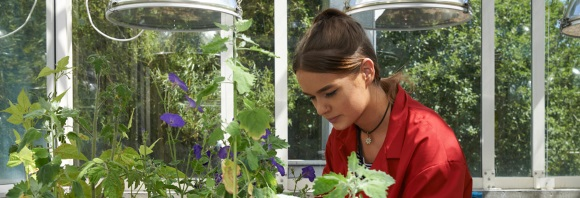Plant Health Undergraduate Studentships 2025
Plant Health Undergraduate Studentships 2025: Student Applications Now Open: Apply by 25th April
Undergraduates – would you like to experience the exciting world of plant science research, tackle a key science challenge, and be paid for it?
We’ve worked with plant scientists to create several fantastic projects that address major plant health challenges identified by the Department for Environment, Food and Rural Affairs (Defra).
Students can now apply to work on these projects for 8-10 weeks this summer. Specific dates will either be indicated on projects or can be discussed when the student is selected for the studentship, but are between June - September. Successful students will receive approx. £400 per week. To be eligible for this award, you must meet the requirements given below.
We are grateful to the Association of Applied Biologists, SCI Horticulture Group and the Colegrave Seabrook Foundation for funding this programme, alongside Defra’s ongoing support.
Why apply for a studentship?
These placements are a great way to:
- Find out what it’s like to contribute to a real research project
- Get research experience and learn new skills to boost your CV
- Meet and work with scientists who can help to answer your career questions
Who can apply?
The scheme is open to undergraduate students registered at a UK institution for the majority of their science degree.
Students in the first year of their course are not eligible for this award.
Students will normally take up the award during the summer vacation in the middle years (i.e. year 2 out of 3, year 2 out of 4, or year 3 out of 4) of their degree but final year undergraduates intending to continue to study for a Masters or PhD may also be considered.
Mature students are encouraged to apply.
The Royal Society of Biology is committed to ensuring equal opportunities in the life sciences, and supports diversity throughout lifetimes at school and higher education, in the workplace and training.
How to apply
To find out more and apply for these studentships, use the links in the project titles below. You will need to create a free mySociety account, but you do not need to be a member of the Royal Society of Biology. If you are not a member, we encourage you to consider Student Affiliate membership.
When applying, you will be asked for the results from your university course to date, and previous qualifications. You will also be asked for a personal statement outlining your reasons for applying for this project, details of any previous employment (if applicable), and about any extracurricular activities.
Your academic tutor and university careers service may be useful sources of advice about your application.
You may apply for more than one studentship project, but to have the best chance of success, we strongly encourage you to tailor your application for each project.
Applications must be received by 23:59 on Friday 25th April 2025.
Please contact registers@rsb.org.uk with any questions.
Other conditions
Selected students will take part in an online mini-symposium during their placement. On completion of their project, students will be required to submit a poster about their project to present at the mini-symposium, and complete a short feedback questionnaire.
A selection of students’ posters may be included in relevant Royal Society of Biology publications.
Please note that projects are subject to the availability of external funding being received. Please do not make any firm commitments prior to confirmation from the Royal Society of Biology.
-----Projects available-----
Investigating lures to attract bark beetles (Forest Research)
Just how specific are species-specific lures used for attracting bark beetles?
Project Location: This project will be managed in-person at Forest Research, Surrey
Supervisor: Mr Christopher Berman
This project involves the opportunity to go to the field, but if the student is unable to due to severe hayfever or accessibility requirements, then there are other alternatives such as laboratory/indoor work.

________________________________________
Exploring pest resistance in oilseed rape (John Innes Centre)
Exploring MAGIC pest resistance in oilseed rape.
Project Location: This project will be managed in-person at the John Innes Centre, Norwich
Supervisor: Dr Ryan Brock
Please note that this research project will take place at the JIC Entomology facility. This involves handling different insect species so is unsuitable for students with insect/arachnid phobias.
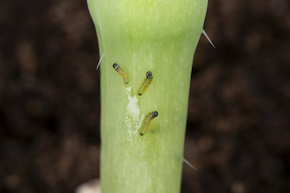
________________________________________
Surveillance for plant viruses related to pollen from bees and hives (Fera Science Ltd)
Surveillance for pollen-associated plant viruses using bees and hive debris as sentinels.
Project Location: This project will be managed in-person at Fera Science Ltd, York
Supervisor: Dr Marco Benucci
This project involves managing pollen and dust.
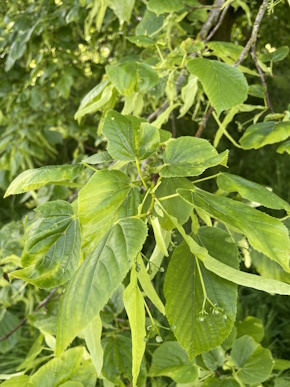
________________________________________
Investigating plant defence molecules and aphid performance (Harper Adams University)
Scentinels of War: How Plant Defence Elicitors Mobilise Aphid Natural Enemies
Project Location: This project will be managed in-person at Harper Adams University, Shropshire. This project is sponsored by the Association of Applied Biologists (AAB).
Supervisor: Dr Joe Roberts
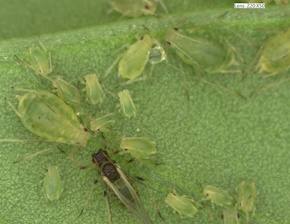
________________________________________
Exploring symbiosis to prevent plant disease (University of Cambridge)
Investigating the Role of Arbuscular Mycorrhizal Symbiosis in Enhancing Plant Disease Resistance Against the Oomycete Pathogen Phytophthora palmivora
Project Location: This project will be managed in-person at University of Cambridge, Cambridge
Supervisor: Dr Jeongmin Choi
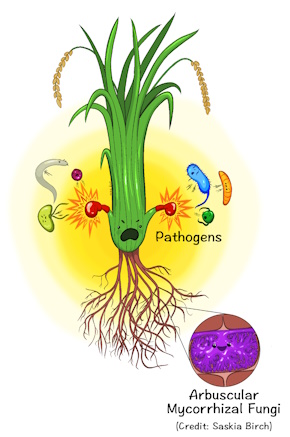
________________________________________
Investigating aphid parasitoids to protect crops (Harper Adams University)
Linking genetic diversity to biological control for improved crop protection
Project Location: This project will be managed in-person at Harper Adams University, Shropshire. This project is sponsored by the SCI Horticulture Group.
Supervisor: Professor Tom Pope
Please note that this project involves working with a range of plants, including strawberries, as well as insects.
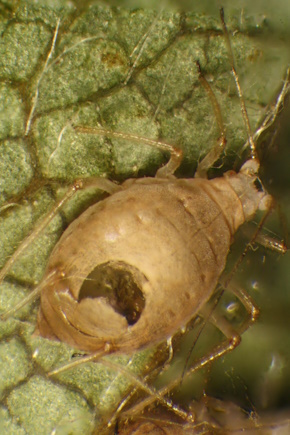
________________________________________
Developing phage cocktails for treating Brassica black rot (University of Warwick)
Phage treatments for black rot disease in vegetable Brassica
Project Location: This project will be managed in-person at the University of Warwick, Coventry. This project is sponsored by the Association of Applied Biologists (AAB).
Supervisor: Dr Mogjan Rabiey
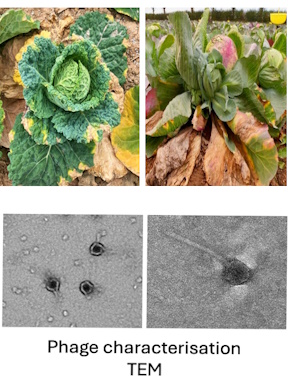
________________________________________
Exploring the use of beetles in natural pest control (Shillingford Organics/University of Exeter)
Pest control ecosystem services in organic farming
Project Location: This project will be managed in-person at the Shillingford Organics, near Exeter.
Supervisor: Professor Daniel Bebber
Please note that students will need to organise their own transportation (e.g. taxi) to get to Shillingford Farm. Due to the outdoor nature of this project, please consider if you have hayfever. Students will be required to complete a risk assessment since they will be on a working farm.
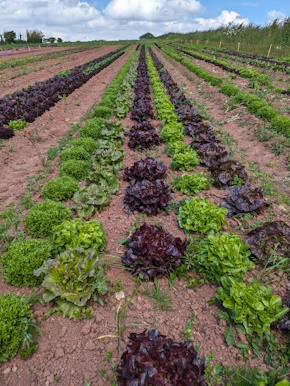
________________________________________
Investigating fungal wheat yield loss using protein modelling (Heriot-Watt University)
Prediction of Zymoseptoria tritici candidate effector isoform structures and interactions
Project Location: This project will be managed in-person at Heriot-Watt University, Edinburgh.
Supervisor: Dr Angela Feechan
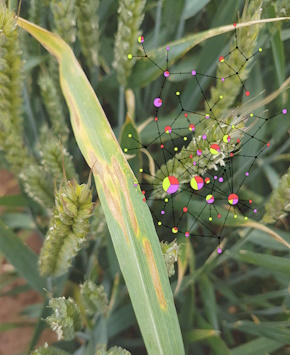
________________________________________
Investigating new bioinsecticides from leaf pathogens (BugBiome)
Bioprospecting from Pathogen-Infected Leaves for Novel Bioinsecticide discovery
Project Location: This project will be managed in-person at BugBiome, Cambridge. This project is sponsored by the Colegrave Seabrook Foundation (CSF).
Supervisor: Dr Alicia Showering
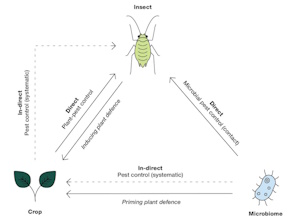
________________________________________
About Plant Health Undergraduate Studentships
The Plant Health Undergraduate Summer Studentships programme aims to:
- Address skills and capacity challenges in plant health science by providing attractive opportunities for research experience to suitable undergraduates, offering them the opportunity to undertake supervised research with leading research groups.
- Facilitate training of undergraduates in research practice.
- Encourage research proposals and generate research outcomes in areas relevant to Defra’s plant health priorities.
- Build networks of research groups, emerging scientists and employers with a focus on plant health.
Plant Health Undergraduate Studentships projects address at least one of the following priorities identified by Defra, related to plant health:
- Risk assessment and horizon scanning
- Inspections, diagnostics and surveillance
- Management of pests and diseases
- Resilience and Adaptation
- Plant Health Behaviours
- Evaluation frameworks
These can be further explored in Defra’s Plant Health Research & Development Plan.
Contact
Please direct queries to registers@rsb.org.uk


